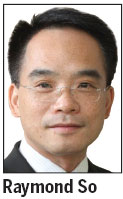Economic development must not be neglected because of politics
Updated: 2013-12-31 07:18
By Raymond So(HK Edition)
|
|||||||||
There is no doubt that the Hong Kong SAR Government is having problems. There are many groups advocating different political views. These views often do not find common ground. Worst still, there are radical views which do not seem to allow any room for agreement. By definition, these political views can find little room for compromise, so disagreements will continue. This is the reality we have to confront.
The public is well aware of the problems Hong Kong faces. However, the current climate focuses heavily on political debate and gives little attention to other more important issues. Take housing as an example. We all are told by the media that there are many underprivileged people who live in subdivided units and poor living conditions. Yet, the decision to vacate more land for public housing is often challenged by different concern groups on grounds of environmental protection, social justice, lack of infrastructure and so on. The end results are rounds of endless debate and discontent. When we read the local newspaper, news coverage on different protests is the norm. One simple and interesting statistic tells the story: on average, there are nearly two demonstrations each day in Hong Kong.
This climate has translated into greater political involvement among people. Surely it is not a bad thing. Indeed, as responsible citizens, we should participate in public engagements and voice our views so we can build a better society. The key point is we should not have a one-sided view or overwhelmingly focus on one issue only. The objective of public engagement is to make Hong Kong a better place and a better society. But other issues are equally important in building a better Hong Kong.
One current piece of news caught my attention. It was about the drop in the tonnage of containers handled by Hong Kong. According to new statistics, the first 11 months of the year saw a drop of over 4 percent. If there is no major change in the last few days of December, it is expected that the total drop of tonnage will be around 4 percent for 2013.

If we look back, the drop is not surprising because we had a major strike by container terminal workers last summer. However, the drop also gives us some cause for concern. Logistics is a major economic pillar of Hong Kong. When Hong Kong moved its industries to the mainland, the city was transformed into a service hub for the Pearl River Delta. Logistics is a vital service industry supporting manufacturing plants in the mainland. With efficient and high quality logistics services, Hong Kong can have a high ranking in terms of tonnage handling. This is a good example of how economic developments in China can lead to mutual benefits for both Hong Kong and the mainland.
However, the drop in tonnage suggests that we should pay attention to recent developments in the economic transformation of the Pearl River Delta. It is well known that traditional industries are moving to inner provinces. When the manufacturing plants are further away from Hong Kong, the demand for Hong Kong's container terminals will be affected. Clearly this is a serious challenge. The drop in tonnage handling reveals such a threat. We should investigate the reasons and develop solutions and strategies to tackle this. Nevertheless, this issue is not well covered by the media. When I check different newspapers, I don't notice much coverage. Even on internet discussion groups, there is little, if any, mention of the subject.
This gives rise to a second thought about Hong Kong's problems. Somehow we over emphasize the differences in political views and ignore other important issues. Economic development is vital to Hong Kong. With sound economic developments, we can have the resources to support the livelihoods of seven million people in the territory. Also, economic developments will attract resources for other projects. I am not saying that we should not get involved in political or social issues. The key point is we should strike a balance.
The author is Dean, School of Business of Hang Seng Management College.
(HK Edition 12/31/2013 page9)